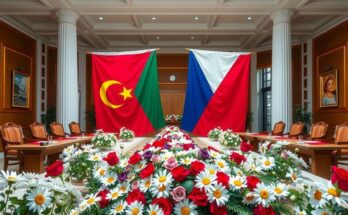Tensions in Juba, South Sudan, rise following the arrests of opposition leaders and military officers aligned with Riek Machar. Clashes in Nasir County have prompted an increased military presence aimed at de-escalating violence. High-level meetings have been convened to address security concerns, while calls for dialogue persist amidst arrests, emphasizing the fragile peace in a country nearing significant elections.
The political climate in Juba, the capital of South Sudan, is experiencing heightened tension following the detainment of opposition politicians and army generals linked to First Vice President Riek Machar. Concerns about instability are rising, particularly in Nasir County, where violence has intermittently erupted, exacerbated by ongoing clashes between the South Sudan People’s Defence Forces (SSPDF) and the White Army, an allied militant group.
On March 4, the White Army intensified its actions by attacking and seizing control of Nasir Town. This unrest coincided with a high-level presidential meeting aimed at addressing escalating security issues in Nasir, Western Equatoria, and Western Bahr el Ghazal states, occurring on March 3 under the leadership of President Salva Kiir Mayardit.
In a letter dated February 27, Riek Machar emphasized the need for urgent dialogue with President Kiir to resolve deteriorating security conditions in Upper Nile and Western Equatoria states, citing a political impasse.
The recent meeting included prominent political figures who supported the smooth deployment of troops from SSPDF to Nasir County, hoping to stabilize the area by replacing long-stationed forces. Information Minister Michael Makuei Lueth reiterated the commitment of the leaders to national unity and emphasized community cooperation for the troops’ safe passage.
Minister Puot Kang highlighted the necessity for local involvement in ensuring peace, and civil society representative Edmond Yakani praised the dialogue for fostering understanding among communities. However, lingering tensions arose after the announcement of an additional military presence, raising local fears regarding potential civilian harm or disarmament efforts.
Escalating violence stemmed from the government’s unilateral actions, such as the removal of SPLM-IO-affiliated governor Gen. Alfred Futuyo, which further aggravated unrest in Western Equatoria State. Clashes ensued after the SSPDF’s attempts to replace soldiers in Nasir, with the army affirming the need for updated manpower.
As part of a broader crackdown, senior officers from the SPLA-IO were detained in Juba, including General Gabriel Duop Lam and others, leading to heightened anxiety within opposition circles. Analysts caution that any resurgence of conflict between Kiir and Machar’s factions might effectively derail the ongoing peace process and jeopardize upcoming elections scheduled for December 2026.
In recent events, security agencies intensified their crackdown on pro-Machar leaders, with National Minister of Peace Building, Stephen Par Kuol, among those detained. Information Minister Makuei defended the arrests as lawful actions responding to rule violations, underscoring the government’s drive for security.
The SPLM-IO decried these detentions as violations of the revitalized peace agreement, emphasizing that such actions undermine trust crucial for conflict resolution. Calls for the release of detained leaders, particularly Gabriel Duop Lam, were reiterated, with the SPLM-IO reaffirming its commitment to the peace agreement.
The ongoing civil unrest, initially sparked by the 2013-2018 conflict, resulted in severe humanitarian crises, and although a 2018 peace deal has moderated some violence, localized hostilities persist. Observers from the International Crisis Group noted an imminent risk of renewed conflict, attributing the perilous situation partly to arms proliferation from the nearby Sudan conflict, which has also adversely impacted South Sudan’s oil exports, critical for its economy.
The emergence of tension in South Sudan following the detainment of opposition leaders highlights serious concerns for national stability. With escalating violence and military mobilizations in response to local unrest, there are fears of a renewed conflict that could undermine the fragile peace established post-civil war. Communication among political leaders, alongside community cooperation, remains crucial in preserving stability as the country approaches critical elections in December 2026. The revitalization of the peace process is imperative to avert further humanitarian disasters and restore security for the South Sudanese people.
Original Source: www.independent.co.ug




